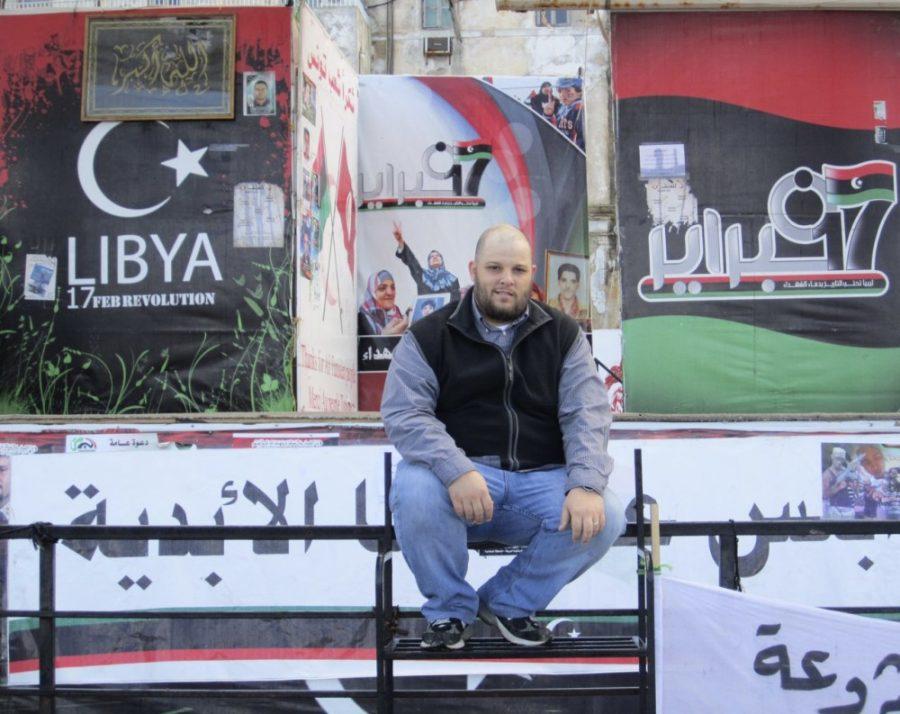Everybody in the tiny office with David Shellouff had a gun — except for him.
As he sat in the middle of them, without a weapon and exhausted from his 20-hour van ride from Egypt to the Libyan border, he knew that unless he did something incredible — or crazy — it was unlikely that the Libyan checkpoint soldiers who were questioning him would let an American cross into their country. So he took a risk.
“I rolled up my sleeve, showed them my ‘Free Libya’ bracelet and said Libya Alhurra (Libya the free). They went nuts,” Shellouff said, smiling as he thumbed through the 600 photos he took on the trip. “The major came around, hugged me and said ‘Welcome home my son. Welcome to your country.’”
Shellouff, a Libyan-American and history senior, had never set foot in his father’s homeland before traveling there last winter break. Safety concerns delayed his trip for decades.
After his grandfather died a few years ago, Shellouff said he promised himself that if the opportunity to visit the land of his ancestors ever presented itself, he’d jump on it. The toppling of Moammar Gadhafi’s government last September provided him with just that opportunity.
“People were telling me I was crazy. I guess I didn’t care that there had just been a revolution,” he said. “I’m an American, but Libya is home, too. And I refused to be scared of home.”
He took a plane to Egypt and a shuttle to neighboring Libya. The shuttle, Shellouff said, looked like a Dodge Caravan and was packed like a can of sardines. Shortly after they left, the van broke down, adding six more hours to his trip.
“Me and the other people just sat on the side of the road for hours,” he said. “I spoke my terrible Arabic, I listened to their terrible English, and we had a great time.”
After the soldiers let him into Libya, Shellouff’s uncle picked him up and they headed toward the city of Benghazi, where his family is from. They took a detour and visited a set of Greek and Roman ruins. As he wandered through the remnants of the ancient empires, dressed in “American clothes” and sporting a Detroit Tigers baseball cap, he said he felt connected to the antiquated civilizations.
“I’m a history major so I’m totally digging all this stuff,” he said. “There was no gate or entrance. People just live among this beautiful untouched part of history. It’s amazing. You want to have a picnic in the middle of Apollo’s temple? Go right ahead.”
Assuming Libya’s new leaders keep their promise to expunge the old authoritarian style of government and replace it with one that grants citizens and tourists more freedoms, they could convert their Hellenic history into future financial profits, he said. The ancient ruins scattered across the country coupled with its Mediterranean coast would enable Libya to become a tourist hub and energize its battered economy.
“Instead of relying on oil and all the other crap, show the world what Libya could be,” he said. “It can be such beautiful place.”
Shellouff’s adventure was split between visiting relatives and seeing the country. He said visiting the katiba military compound, where rebels and Gadhafi loyalists fought for control of Benghazi, is one of the more powerful memories of his trip, for reasons both uplifting and tragic.
For years, the katiba compound housed torture machines that terrorized political prisoners.
Within katiba was one of Gadhafi’s houses. It was three stories tall and had a dozen bathrooms. When Shellouff got there, he picked up chunks of rocks and hurled them at the building, a rundown structure that hardly looked like it used to belong to the most powerful man in Libya.
Shellouff walked back and forth across the compound, listening as his uncle described how the battle unfolded.
“It was the staging ground where average, everyday Libyans got together and started a revolution,” he said. “The person who set the whole thing off was a man who put explosives in his car and drove it into the front gate of katiba. He gave his life for Benghazi.”
A few weeks later, it was time to head back to the UA. He said his goodbyes and promised that the next he came, he’d bring his father, Mohmed, who hasn’t been home in more than 30 years.
“The spirit and hope of the Libyan people is what stayed with me the most,” Shellouff said. “I’ve never seen the desire for a better future like that anywhere in my life. Maybe it was just a special time to be there because the revolution had just ended, but for me, it doesn’t get more amazing than that.”









